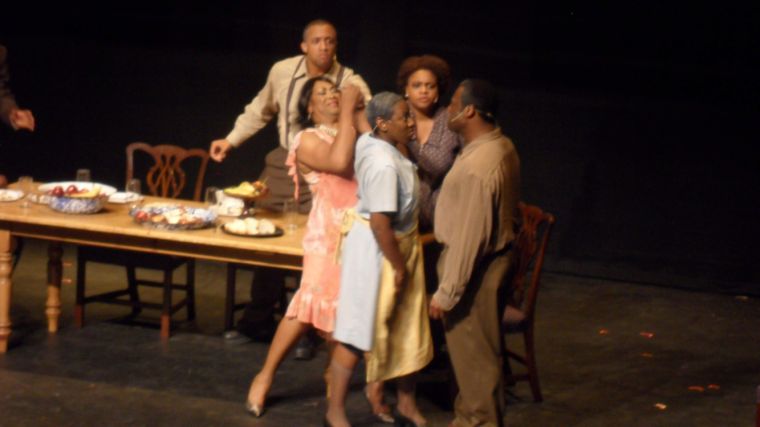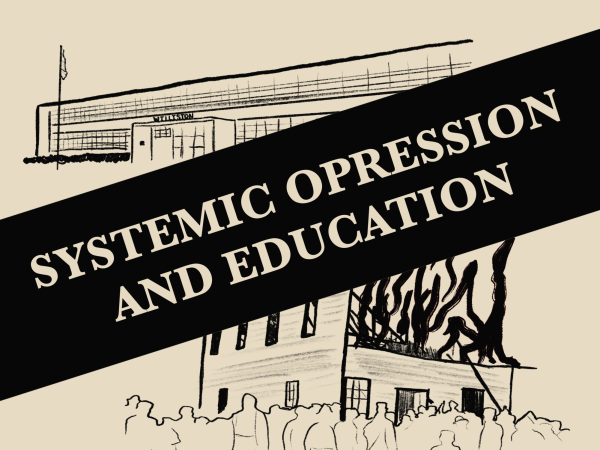“The Color Purple” showcased in downtown Wilmington
City Stage and True 2 You Productions presented the Wilmington premiere of “The Color Purple” musical at the Thalian Hall Center for Performing Arts. The musical combines aspects from Alice Walker’s novel and Steven Spielberg’s film to tell the unforgettable story of a woman suffering to find her voice and the strength to take control of her life in a male-dominated society.
The musical showcased local actors, like Kim Pacheco who plays the female lead, Celie, and UNCW senior Tré Cotten who plays Harpo, one of the male leads. Director Justin Smith constructed a cast of actors with voices packed with power and beauty.
“The cast is absolutely phenomena,” said Pacheco..”Justin was very clear-when he initially called me to thank me for taking on the role of Celie-that he was not hiring good singers and good actors. He was hiring actors that were just as good at acting as they were singing, so there isn’t a deficiency in that area. And I think he did a phenomenal job at putting that cast together.”
The story took the audience on a journey through Celie’s life and the hardships she faced. This was Pacheco’s first theatrical performance involving a script in over 12 years. Prior to this musical she starred in productions such as “The Trombone,” “Blazin’ in the Sun,” as well as sold out tours throughout British Columbia and Saskatchewan.
“I think part of my interest in being in this musical is it completes for me my knowledge of ‘The Color Purple,'” Pacheco said. “It’s such an iconic piece of work.”
One of the tasks expected of the actors was taking on the personality of their character and making them come to life for the audience. While “The Color Purple” poses many challenging roles, Cotten, who plays the role of Harpo, found learning to represent his character a lot of fun.
“Playing the role of Harpo, I admire it so much because there are so many layers to this person,” said Cotten. “He represents the new age of a man for that time because there’s a generation curse between my father, Mister, and old Mister, my grandfather. I go against the grain of what a man is supposed to do. I love Harpo so much because he shows his heart, and he says it’s fine for a wife to have a say in the household and it’s fine to show love towards your father and everybody else. Harpo has what an actor loves, which is the internal hope for good, and he’s a lot like me in the sense of caring.”
When playing Harpo, Cotten was able to make a serious connection with the audience while also making them laugh.
Beginning his career only two years ago, “The Color Purple” gave Cotten a chance to be in a show with a mostly African American cast–something he’d never experienced before.
“To be working with professional actors and actors who were on Broadway, it was just learning,” Cotten said. “I played a sponge where I just soaked up everything and got a chance to react, because acting is reacting.”
Aside from the actors, the musical would not have been a success without the band and its conductor. The ensemble was made up of drums, bass, guitar, trombone, trumpet, reeds and piano. Although the actors’ voices could hold their own without a musical ballet, the band provided intensity and drama to the performance.
“I think it’s very entertaining and the characters are very artistic,” said Larry Sutton, a local audience member that was there with his family to enjoy the musical on opening night. ” It’s just a good play, and I really like it. The music is fantastic, everything is just good.”
Pacheco described the musical as being filled with words of intention. According to her, the script was so well written that if you wanted to just get on stage and sing what was written, you could.
Adapting to her character as Celie posed a challenge for Pacheco since she had seen the movie so many times and got used to the roles of those characters. With the play version, she had to take on the personality of Celie to convey her emotions and reactions to various conflicts she faced in her life.
“What I admire most about her is that she finds a way to make do,” Pacheco. “No matter what situation or circumstance she finds herself in, she finds a place to be happy. Either she’s content with Harpo, or she’s content in a chair or content with her sister. Even though she’s pregnant having been raped by her father twice and has two babies that she doesn’t know where they are, she finds a way to find some kind of inner peace in knowing this is just the way it is, and if you’re going to live you might as well find a sense of peace about the situation.”
As an audience member, you witnessed the women bought and sold by black men, sometimes to other black men or white families, so they could take care of the children, cook, clean, sew and sexually perform for their men. The women were verbally and physically abused–constantly put down by men in society who felt superior. Each member in the audience reacted differently to the musical’s different messages.
“Well, some people are going to take love, some people are going to take hope, some people are going to take strength and some people are going to take endurance, but some people aren’t going to take anything,” Pacheco said. “I guess my prayer honestly is that they take what they need, and I can’t say what that is because I don’t know what that is, but I hope that when they come that whatever need they have has been met.”
The entire cast and crew offered a lot of talent, and the audience could feel the connection they developed with each another. However, the cast fed off the reactions of the audience as well.
According to Cotton, everyone should be able to laugh and cry at “The Color Purple’s” raw and real story.
“I hope the audience takes that all people from all walks of life can take something from this musical–that it’s not just a show about black people,” said Cotten. “Everybody can relate to love no matter who you like whether their gender, race, or height. It’s about love and finding yourself, and knowing that okay, I am here. No matter what others say about you, you have to have that self-love.”












